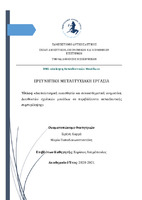| dc.contributor.advisor | Ασημόπουλος, Χαρίσιος | |
| dc.contributor.author | Καρρά, Ειρήνη | |
| dc.contributor.author | Παπαδοκωνσταντάκη, Μαρία | |
| dc.date.accessioned | 2021-03-10T09:25:29Z | |
| dc.date.available | 2021-03-10T09:25:29Z | |
| dc.date.issued | 2021-02-25 | |
| dc.identifier.uri | https://polynoe.lib.uniwa.gr/xmlui/handle/11400/342 | |
| dc.identifier.uri | http://dx.doi.org/10.26265/polynoe-193 | |
| dc.description.abstract | Η συμπεριληπτική εκπαίδευση αποτελεί αντικείμενο επιστημονικών μελετών σε παγκόσμιο επίπεδο, διότι αποτελεί απαραίτητη προϋπόθεση για την προαγωγή της ισότητας και την εξασφάλιση της καθολικής προσβασιμότητας στην εκπαίδευση για όλα τα παιδιά. Στην παρούσα μελέτη, ο όρος συμπερίληψη εξετάζεται κυρίως με την έννοια της εκπαίδευσης μαθητών από διαφορετικά γλωσσικά και πολιτισμικά περιβάλλοντα. Σκοπός της παρούσας έρευνας ήταν η μέτρηση του βαθμού διαπολιτισμικής ευαισθησίας των Διευθυντών Δευτεροβάθμιας Εκπαίδευσης (Δ.Δ.Ε.) Πειραιά, καθώς και των δημογραφικών, γεωγραφικών και εργασιακών παραγόντων, που την επηρεάζουν. Επιπλέον, διερευνήθηκε η σχέση της συναισθηματικής νοημοσύνης των Διευθυντών με τη διαπολιτισμική ευαισθησία. Υλικό – Μέθοδος: Το δείγμα αποτέλεσαν 125 (n=125) Διευθυντές των «τυπικών» σχολείων της Δ.Δ.Ε. Πειραιά, που υπηρετούν σε σχολεία τόσο αστικών όσο και νησιωτικών περιοχών. Ως μέθοδος συλλογής δεδομένων χρησιμοποιήθηκε το ηλεκτρονικό ερωτηματολόγιο, το οποίο αποτελούνταν από τρία μέρη: Το πρώτο περιλάμβανε 14 ερωτήσεις, οι οποίες αφορούσαν σε δημογραφικά και εργασιακά - εκπαιδευτικά χαρακτηριστικά των Διευθυντών. Το δεύτερο μέρος αφορούσε στην κλίμακα της διαπολιτισμικής ευαισθησίας «Intercultural Sensitivity Scale (ISS)» (Chen & Starosta, 2000). Το τρίτο μέρος αποτέλεσε η κλίμακα της Συναισθηματικής Νοημοσύνης «Wong & Law Emotional Intelligence Scale - WEILS» (Wang & Law, 2002). Η στατιστική ανάλυση πραγματοποιήθηκε με το στατιστικό πακέτο για τις κοινωνικές επιστήμες IBM Statistical Package for Social Sciences (SPSS), έκδοση 26.0. Αποτελέσματα Η Διαπολιτισμική ευαισθησία του δείγματος βρέθηκε υψηλή, με υψηλότερη τη διάσταση «Απόλαυση της Αλληλεπίδρασης». Η Συναισθηματική Νοημοσύνη του δείγματος βρέθηκε επίσης υψηλή, με υψηλότερη τη διάσταση «Χρήση συναισθημάτων». Στατιστικά σημαντική θετική σχέση ανιχνεύτηκε μεταξύ της Διαπολιτισμικής ευαισθησίας και του φύλου, με τις γυναίκες Διευθύντριες να παρουσιάζονται περισσότερο ευαισθητοποιημένες. Η ηλικιακή ομάδα 53-60 ετών εμφάνισε υψηλότερο βαθμό διαπολιτισμικής ευαισθησίας. Επιπλέον, βρέθηκε μια στατιστικά σημαντική θετική συσχέτιση της διαπολιτισμικής ευαισθησίας με την συνολική κλίμακα της συναισθηματικής νοημοσύνης, καθώς και με όλες τις διαστάσεις της. Η αύξηση της κλίμακας της Συναισθηματικής Νοημοσύνης και ο αυξημένος αριθμός μαθητών από διαφορετικά γλωσσικά και πολιτισμικά περιβάλλοντα στο σχολείο, σχετίζονταν με αύξηση της μέσης βαθμολογίας της κλίμακας Διαπολιτισμικής ευαισθησίας. | el |
| dc.format.extent | 153 | el |
| dc.language.iso | el | el |
| dc.publisher | Πανεπιστήμιο Δυτικής Αττικής | el |
| dc.rights | Αναφορά Δημιουργού - Μη Εμπορική Χρήση - Παρόμοια Διανομή 4.0 Διεθνές | * |
| dc.rights | Attribution-NonCommercial-NoDerivatives 4.0 Διεθνές | * |
| dc.rights.uri | http://creativecommons.org/licenses/by-nc-nd/4.0/ | * |
| dc.subject | Συμπερίληψη | el |
| dc.subject | Διαπολιτισμική εκπαίδευση | el |
| dc.subject | Συναισθηματική νοημοσύνη | el |
| dc.subject | Διευθυντές σχολικών μονάδων | el |
| dc.subject | Συμπεριληπτική εκπαίδευση | |
| dc.title | Διαπολιτισμική ευαισθησία και συναισθηματική νοημοσύνη διευθυντών σχολικών μονάδων σε περιβάλλοντα εκπαιδευτικής συμπερίληψης | el |
| dc.title.alternative | Intercultural sensitivity and emotional intelligence of principals of schools in environments of inclusive education | el |
| dc.type | Μεταπτυχιακή διπλωματική εργασία | el |
| dc.contributor.committee | Πιερράκος, Γεώργιος | |
| dc.contributor.committee | Spyridakos, Athanasios | |
| dc.contributor.faculty | Σχολή Διοικητικών, Οικονομικών & Κοινωνικών Επιστημών | el |
| dc.contributor.department | Τμήμα Διοίκησης Επιχειρήσεων | el |
| dc.contributor.master | Διοίκηση Εκπαιδευτικών Μονάδων | el |
| dc.description.abstracttranslated | Inclusive education has been the subject of scientific research worldwide, as it is a prerequisite for promoting equality and ensuring universal access to education for all children. In the present study, the term inclusion is considered in the broadest sense, including the students’education from different linguistic and cultural backgrounds. The purpose of the present study is to estimate the level of intercultural sensitivity which the secondary education principals of the Piraeus Secondary Education Department have embraced as well as the demographic, geographical and occupational factors that affect it. Furthermore, great consideration has been taken into studying and examining the relation between the principals' emotional intelligence and intercultural sensitivity.
Material - Method The sample consisted of 125 (n=125) principals of the formal schools of the Directorate of Secondary Education of Piraeus, who serve in schools in both urban and island areas. The electronic questionnaire was used as a method of data collection, which consisted of three parts: The first and the second part included 14 questions were related to demographic and occupational - educational characteristics. The third part concerned the Intercultural Sensitivity Scale (ISS) (Chen &Starosta, 2000). The fourth part was the Emotional Intelligence Scale (Wong & Law Emotional Intelligence Scale-WEILS) (Wang & Law, 2002). The statistical analyzing was performed with the statistical package for the social sciences IBM Statistical Package for Social Sciences (SPSS), version 26.0. Results: The intercultural sensitivity of the sample was found to be high, with a higher dimension of "Enjoyment of Interaction". The Emotional Intelligence of the sample was also found to be high, with the higher dimension "Using Emotions". A statistically significant positive relationship was found between Intercultural Sensitivity and gender, with female principals being more aware. The age group 53-60 years showed a higher degree of intercultural sensitivity. In addition, a statistically significant positive correlation was found between intercultural sensitivity and the overall scale of emotional intelligence, as well as with all its dimensions. The increase in the Emotional Intelligence scale and the increased number of students from different linguistic and cultural backgrounds at school were associated with an increase in the average score on the Intercultural Sensitivity scale. | el |


